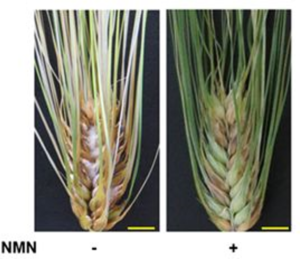Nicotinamide Mononucleotide and Related Metabolites Induce Disease Resistance Against Fungal Phytopathogens in Arabidopsis and Barley (OA)
 Sci. Rep. Plant defense activators are organic molecules that do not possess antimicrobial activity but have been shown to enhance plant disease resistance mechanisms. A comparison of some Fusarium-resistant and -susceptible barely cultivars suggested that NMN may act as a plant defense activator.
Sci. Rep. Plant defense activators are organic molecules that do not possess antimicrobial activity but have been shown to enhance plant disease resistance mechanisms. A comparison of some Fusarium-resistant and -susceptible barely cultivars suggested that NMN may act as a plant defense activator.
RNAseq data revealed salicylic acid induction and cell death repression in NMN-pretreated Arabidopsis leaves inoculated with F. graminearum, while jasmonic acid and ethylene signaling appeared to be downregulated. Protective effects were also visible in NMN-pretreated barley plants as well as in NMN-pretreated Arabidopsis salicylic-acid (SA) deficient sid2 mutant, suggesting that the enhanced disease resistance also involves SA-independent signaling pathways.
To observe the effects of endogenously produced nicotinamide cofactors, the NMNAT gene – which converts NMN to NAD and represents a bottleneck of the biosynthetic pathway – was overexpressed. NMNAT overexpression was successful in increasing both the endogenous NAD content and plant resistance. Thus, modulation of nicotinic cofactors appears to be a valuable strategy to increase plant resistance to pathogens. (Summary by Elisa Dell’Aglio) Sci. Rep. 10.1038/s41598-017-06048-8



